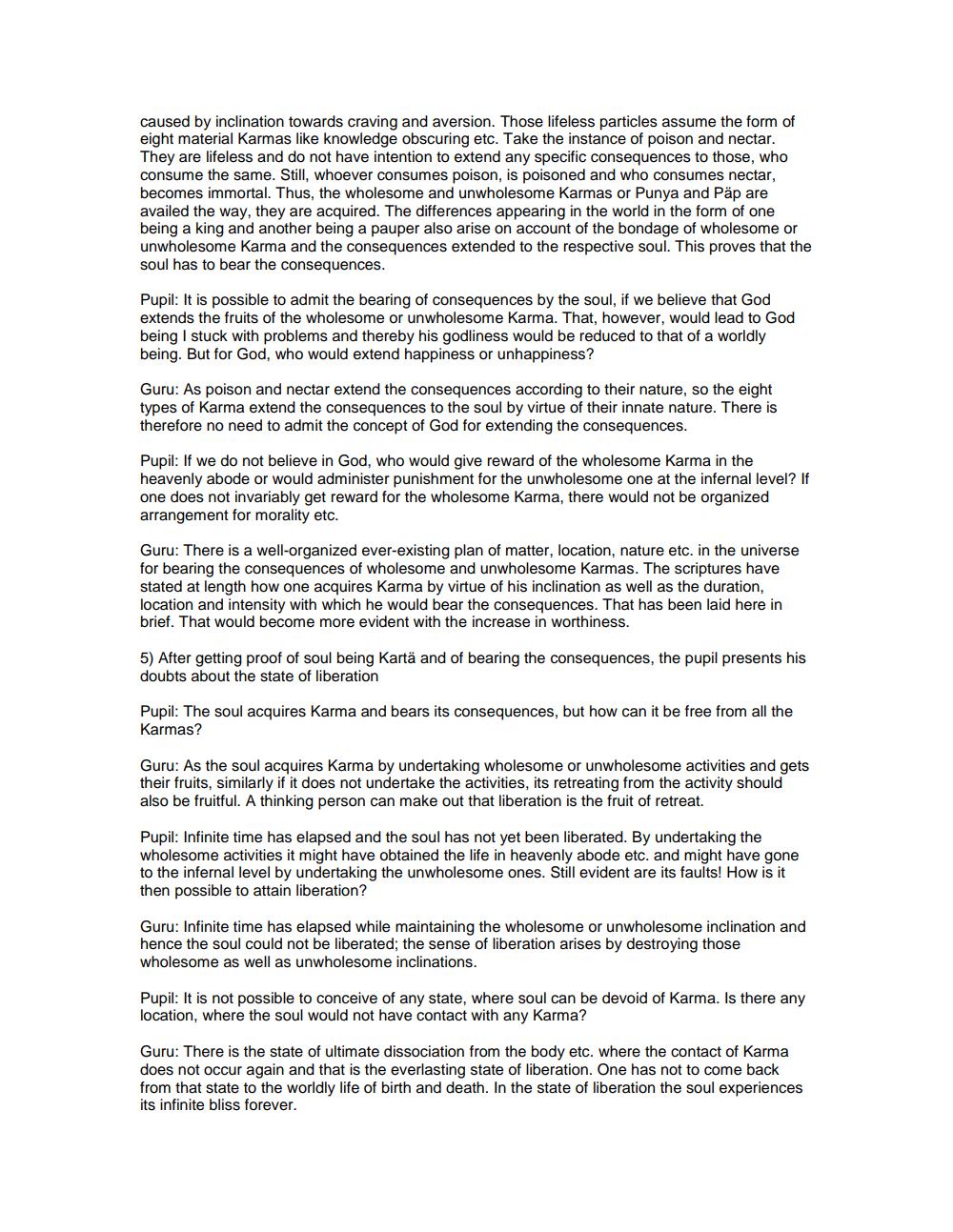________________
caused by inclination towards craving and aversion. Those lifeless particles assume the form of eight material Karmas like knowledge obscuring etc. Take the instance of poison and nectar. They are lifeless and do not have intention to extend any specific consequences to those, who consume the same. Still, whoever consumes poison, is poisoned and who consumes nectar, becomes immortal. Thus, the wholesome and unwholesome Karmas or Punya and Päp are availed the way, they are acquired. The differences appearing in the world in the form of one being a king and another being a pauper also arise on account of the bondage of wholesome or unwholesome Karma and the consequences extended to the respective soul. This proves that the soul has to bear the consequences.
Pupil: It is possible to admit the bearing of consequences by the soul, if we believe that God extends the fruits of the wholesome or unwholesome Karma. That, however, would lead to God being I stuck with problems and thereby his godliness would be reduced to that of a worldly being. But for God, who would extend happiness or unhappiness?
Guru: As poison and nectar extend the consequences according to their nature, so the eight types of Karma extend the consequences to the soul by virtue of their innate nature. There is therefore no need to admit the concept of God for extending the consequences.
Pupil: If we do not believe in God, who would give reward of the wholesome Karma in the heavenly abode or would administer punishment for the unwholesome one at the infernal level? If one does not invariably get reward for the wholesome Karma, there would not be organized arrangement for morality etc.
Guru: There is a well-organized ever-existing plan of matter, location, nature etc. in the universe for bearing the consequences of wholesome and unwholesome Karmas. The scriptures have stated at length how one acquires Karma by virtue of his inclination as well as the duration, location and intensity with which he would bear the consequences. That has been laid here in brief. That would become more evident with the increase in worthiness.
5) After getting proof of soul being Kartä and of bearing the consequences, the pupil presents his doubts about the state of liberation
Pupil: The soul acquires Karma and bears its consequences, but how can it be free from all the Karmas?
Guru: As the soul acquires Karma by undertaking wholesome or unwholesome activities and gets their fruits, similarly if it does not undertake the activities, its retreating from the activity should also be fruitful. A thinking person can make out that liberation is the fruit of retreat.
Pupil: Infinite time has elapsed and the soul has not yet been liberated. By undertaking the wholesome activities it might have obtained the life in heavenly abode etc. and might have gone to the infernal level by undertaking the unwholesome ones. Still evident are its faults! How is it then possible to attain liberation?
Guru: Infinite time has elapsed while maintaining the wholesome or unwholesome inclination and hence the soul could not be liberated; the sense of liberation arises by destroying those wholesome as well as unwholesome inclinations.
Pupil: It is not possible to conceive of any state, where soul can be devoid of Karma. Is there any location, where the soul would not have contact with any Karma?
Guru: There is the state of ultimate dissociation from the body etc. where the contact of Karma does not occur again and that is the everlasting state of liberation. One has not to come back from that state to the worldly life of birth and death. In the state of liberation the soul experiences its infinite bliss forever.




